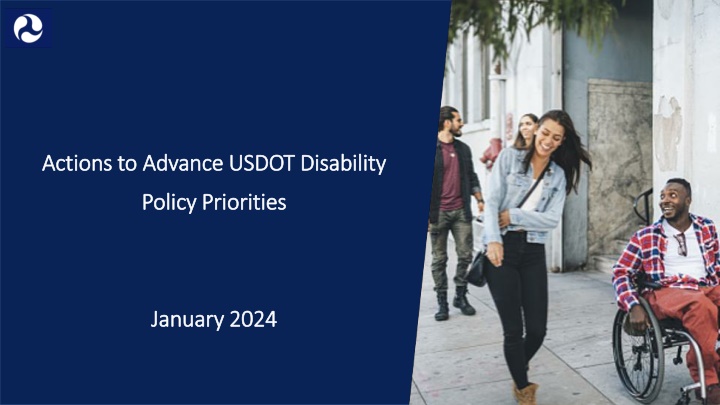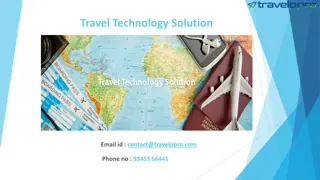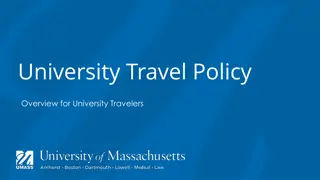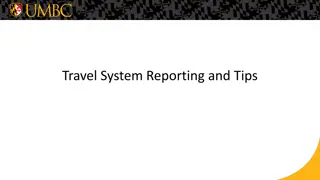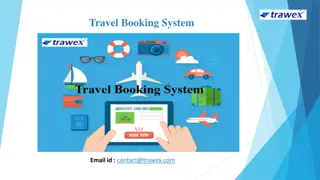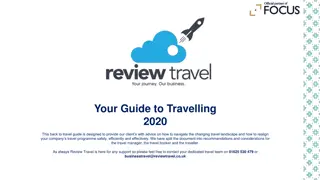Advancing USDOT Disability Policy Priorities for Safe and Accessible Air Travel
Deliberative draft outlines USDOT's disability policy priorities, including enabling safe and accessible air travel by addressing mishandling of wheelchairs on flights and ensuring passengers can stay in their own wheelchairs during air travel. Actions include developing a research roadmap for wheelchair securement on aircraft, issuing rulemaking for accommodations, expanding compliance efforts, and educating individuals with disabilities on their rights under the Air Carrier Access Act.
Download Presentation

Please find below an Image/Link to download the presentation.
The content on the website is provided AS IS for your information and personal use only. It may not be sold, licensed, or shared on other websites without obtaining consent from the author.If you encounter any issues during the download, it is possible that the publisher has removed the file from their server.
You are allowed to download the files provided on this website for personal or commercial use, subject to the condition that they are used lawfully. All files are the property of their respective owners.
The content on the website is provided AS IS for your information and personal use only. It may not be sold, licensed, or shared on other websites without obtaining consent from the author.
E N D
Presentation Transcript
Actions to Advance USDOT Disability Actions to Advance USDOT Disability Policy Priorities Policy Priorities January 2024 January 2024
USDOT Disability Policy Priorities Deliberative Draft Preliminary and Incomplete
DOT Disability Policy Priorities and Foundational Actions Enable access to good-paying jobs and business opportunities for people with disabilities Enable Enable multimodal accessibility of public rights-of- way accessibility of electric vehicle charging & automated vehicles Enable safe and accessible air travel Reinvigorate programmatic enforcement of the Air Carrier Access Act, Americans with Disabilities Act, Section 504 of the Rehabilitation Act, and Section 508 of the Rehabilitation Act Advance diversity, equity, inclusion, and accessibility in the DOT workforce Address gaps in data on people with disabilities to inform policymaking Ensure all DOT meetings and resources are fully accessible to people with disabilities Deliberative Draft Preliminary and Incomplete
Priority: Enable Safe and Accessible Air Travel More than 12,000 wheelchairs were mishandled on flights between October 2022 and October 2023. Enabling passengers to stay in their personal wheelchairs on aircraft will increase the safety and dignity of air travel and increase access for travelers with disabilities.
USDOT Actions to Enable Safe and Accessible Air Travel Develop and advance a research roadmap, building from the Access Board / TRB Report on the Feasibility of Wheelchair Securement Systems on Passenger Aircraft, to support future rulemaking Issue rulemaking on Ensuring Safe Accommodations for Air Travelers with Disabilities Using Wheelchairs Issue NPRM and Final Rule on Accessible Lavatories on Single-Aisle Aircraft: Part 2 Expand compliance and enforcement activities related to the Air Carrier Access Act and its implementing regulation in 14 CFR Part 382 Educate people with disabilities about their rights under ACAA and how to exercise them Deliberative Draft Preliminary and Incomplete
Priority: Enable Safe and Accessible Air Travel Impact Action Completed. The research roadmap was published on USDOT's website and promoted as part of the July 2023 anniversary of the ADA. USDOT plans to complete this roadmap by December 2025. Develop and advance a research roadmap,building from the Access Board / TRB Report on the Feasibility of Wheelchair Securement Systems on Passenger Aircraft, to support future rulemaking Passengers can stay in their personal wheelchairson aircraft, a generational improvement in the equity, safety, and dignity of travel Decrease in number of passengers with disabilities whose wheelchairs are damaged during air travel and are injured in transfers to/from aircraft Issue rulemaking on Ensuring Safe Accommodations for Air Travelers with Disabilities Using Wheelchairs Issue NPRM and Final Rule on Accessible Lavatories on Single-Aisle Aircraft: Part 2 Passengers in wheelchairs can access lavatories on aircraft Expand compliance and enforcement activities related to the Air Carrier Access Act and its implementing regulation in 14 CFR Part 382 Decrease in frequency of incidents where passengers civil rights are violated and increase in equal access to quality air transportation service for persons with disabilities Educate people with disabilities about their rights under ACAA and how to exercise them Deliberative Draft Preliminary and Incomplete
Priority: Enable Safe and Accessible Air Travel Impact Action Develop and advance a research roadmap, building from the Access Board / TRB Report on the Feasibility of Wheelchair Securement Systems on Passenger Aircraft, to support future rulemaking Passengers can stay in their personal wheelchairs on aircraft, a generational improvement in the equity, safety, and dignity of travel Completed. The final rule was published in August 2023. Accessible lavatories will be required on new large single-aisle aircraft. In the short term, the rule requires airlines to provide accessible lavatory interior features, to improve the safety and accessibility of on- board wheelchairs (OBWs), and to inform passengers on request about lavatory accessibility. In the long term, the rule requires airlines to install lavatories large enough for a passenger using an OBW, along with an attendant. We expect this rule to benefit millions of individuals with mobility impairments who cannot independently access the lavatory. Decrease in number of passengers with disabilities whose wheelchairs are damaged during air travel and are injured in transfers to/from aircraft Issue rulemaking on Ensuring Safe Accommodations for Air Travelers with Disabilities Using Wheelchairs Issue NPRM and Final Rule on Accessible Lavatories on Single-Aisle Aircraft: Part 2 Passengers in wheelchairs can access lavatories on aircraft Expand compliance and enforcement activities related to the Air Carrier Access Act and its implementing regulation in 14 CFR Part 382 Decrease in frequency of incidents where passengers civil rights are violated and increase in equal access to quality air transportation service for persons with disabilities Educate people with disabilities about their rights under ACAA and how to exercise them Deliberative Draft Preliminary and Incomplete
Priority: Enable Safe and Accessible Air Travel Impact Action Completed. In December 2023, the Office of Airline Consumer Protection (OACP) revised travel tips for wheelchair users on its website in order to further educate passengers with disabilities about the benefits of sharing information in advance with the airlines about their wheelchairs and scooters. Among other things, the updates instruct passengers to provide notice in advance to airlines whenever possible, to share device information (e.g., weight and dimensions) for better handling, and to check with the airline if it offers a wheelchair information request form. Develop and advance a research roadmap, building from the Access Board / TRB Report on the Feasibility of Wheelchair Securement Systems on Passenger Aircraft, to support future rulemaking Passengers can stay in their personal wheelchairs on aircraft, a generational improvement in the equity, safety, and dignity of travel Decrease in number of passengers with disabilities whose wheelchairs are damaged during air travel and are injured in transfers to/from aircraft Issue rulemaking on Ensuring Safe Accommodations for Air Travelers with Disabilities Using Wheelchairs Issue NPRM and Final Rule on Accessible Lavatories on Single-Aisle Aircraft: Part 2 Passengers in wheelchairs can access lavatories on aircraft Expand compliance and enforcement activities related to the Air Carrier Access Act and its implementing regulation in 14 CFR Part 382 Decrease in frequency of incidents where passengers civil rights are violated and increase in equal access to quality air transportation service for persons with disabilities Educate people with disabilities about their rights under ACAA and how to exercise them Deliberative Draft Preliminary and Incomplete
Airline Passengers with Disabilities Bill of Rights The Bill of Rights applies to people with disabilities traveling on flights to, from, and within the United States. It describes the fundamental rights of air travelers with disabilities under the Air Carrier Access Act. 1. The Right to Be Treated with Dignity and Respect 2. The Right to Receive Information About Services and Aircraft Capabilities and Limitations 3. The Right to Receive Information in an Accessible Format 4. The Right to Accessible Airport Facilities 5. The Right to Assistance at Airports 6. The Right to Assistance on the Aircraft 7. The Right to Travel with an Assistive Device or Service Animal 8. The Right to Receive Seating Accommodations 9. The Right to Accessible Aircraft Features 10.The Right to Resolution of a Disability-Related Issue Deliberative Draft Preliminary and Incomplete
Priority: Enable Multimodal Accessibility of Public Transportation Facilities, Vehicles, and Rights-of-Way According to the National Transit Database in 2022, nearly 17% of all transit stations in the U.S. were not accessible. As of 2023, FHWA has not accepted ADA Transition Plans for 4 States and territories. Our streets should be safe for everyone, regardless of age or ability.
USDOT Actions to Enable Multimodal Accessibility of Public Transportation Facilities, Vehicles, and Rights-of-Way Issue NPRM and Final Rule on Accessibility Standards for Pedestrian Facilities in the Public Right- of-Way and promote awareness and adoption Require State and local DOTs to complete ADA Transition Plans to eliminate legacy inaccessible infrastructure and work with them to implement ADA transition plans through formula and discretionary funding in the BIL; Enforce ADA compliance in new investments Promote opportunities for infrastructure investment in rural and Tribal communities, where roadways, sidewalks, and street crossings may be in need of repair Issue NPRM and Final Rule on Equitable Access to Transit Facilities, updating minimum guidelines Make legacy transit rail stations and facilities accessible through the All Stations Accessibility Program in the BIL and enforce ADA compliance in new investments in rail stations and vehicles Enforce ADA compliance in existing and new investments in Amtrak stations and rail vehicles Promote opportunities for federal funding and financing to expand transportation alternatives for people with disabilities living in rural communities Deliberative Draft Preliminary and Incomplete
Priority: Enable Multimodal Accessibility of Public Transportation Facilities, Vehicles, and Rights-of-Way Impact Action Completed. ROUTES released a revised Rural Grant Applicant Toolkit for Competitive Federal Transportation Funding (November 2023) and companion DOT Discretionary Grants Dashboard (May 2023) to help communities navigate and apply for discretionary opportunities. The revised Toolkit and Dashboard provide expanded content on DOT requirements related to Civil Rights and Nondiscrimination and identify grants that can be used for projects that improve accessibility. Issue NPRM and Final Rule on Accessibility Standards for Pedestrian Facilities in the Public Right-of-Wayand promote awareness and adoption People with disabilities can safely access roadways, sidewalks, and street crossings, reducing the number of pedestrian fatalities Require State and local DOTs to complete ADA Transition Plans to eliminate legacy inaccessible infrastructure and work with them to implement ADA transition plans throughformula and discretionary funding in the BIL; Enforce ADA compliance in new investments Promote opportunities for infrastructure investment in rural and Tribal communities, where roadways, sidewalks, and street crossings may be in need of repair Issue NPRM and Final Rule on Equitable Access to Transit Facilities, updating minimum guidelines Make legacy transit rail stations and facilities accessible through the All Stations Accessibility Program in the BIL and enforce ADA compliance in new investments in rail stations and vehicles People with disabilities can reliably access all public transit rail stations and facilities, increasi ng independenttravel Enforce ADA compliance in existing and new investments in Amtrak stations and rail vehicles Promote opportunities for federal funding and financing to expand transportation alternatives for people with disabilities living in rural communities Deliberative Draft Preliminary and Incomplete
Priority: Enable Access to Good Paying Jobs and Business Opportunities The labor force participation rate of American adults with disabilities is approximately half of that of the population of adults without disabilities, and the unemployment rate is approximately double.
USDOT Actions to Enable Access to Good Paying Jobs and Business Opportunities Incorporate standard language on encouraging hiring of people with disabilities in discretionary DOT grant NOFOs and explanatory materials. Engage state, local, and private sector leaders to encourage programs that prioritize hiring of people with disabilities in DOT-funded projects Promote Disadvantaged Business Enterprise (DBE) program to the disability community Incorporate standard language encouraging hiring of people with disabilities in DOT direct contracts Coordinate with other federal agencies on regulatory and policy actions to expand broadband Deliberative Draft Preliminary and Incomplete
Priority: Enable Accessibility of Electric Vehicle Charging and Automated Vehicles Current ADA standards do not fully address EV charging infrastructure, risking lack of access for people with disabilities. For example, the weight of EV charging cables makes them inaccessible to some.
USDOT Actions to Enable Accessibility of Electric Vehicle Charging and Automated Vehicles Accelerate development and adoption of accessibility standards for rollout of the national electric vehicle charging network in the Bipartisan Infrastructure Law Help manufacturers and designers identify and integrate accessibility considerations in AVs for the diverse needs of people with disabilities Incentivize development of accessible automated vehicles and promote inclusive design to the next generation of automotive engineers Deliberative Draft Preliminary and Incomplete
Foundational Actions Reinvigorate Programmatic Enforcement of ACCA, ADA, Section 504, and Section 508 Advance Diversity, Equity, Inclusion, and Accessibility in the DOT Workforce (DOCR, OST-M) Address Gaps in Data on People with Disabilities to Inform Policymaking (OST-R, OST-P) Ensure all Internal and External DOT Meetings and Resources are Fully Accessible to People with Disabilities (DOCR, OCIO, OST-M) Conduct strategic planning for ADA, Section 504, and ACAA programs. Support activities outlined within the DOT DEIA Strategic Plan to proactively support accessibility and establish a culture of equitable access. Quantify benefits of transportation investments for people with disabilities Research current resources, identify challenges, recommend and implement solutions, including potential updates to DOT Guidance for Accessible Workplace Programs and Activities for Individuals with Disabilities Support comprehensive pre-award compliance activities, including ensuring that civil rights compliance is reflected in NOFOs and pre-award assessments. Develop roadmap for economic analysis of accessible travel Conduct data analysis to determine whether DOT employees, particularly DOT employees from underserved communities, such as people with disabilities, appear to progress or pause at specific grade levels. Create National Transportation Atlas Database layers for walking networks and accessible facilities Drive proactive civil rights training and compliance, including a new DOT order on ADA and Section 504 and technical assistance through the Thriving Communities Initiative. Explore options to improve the process and resourcing for external meeting accessibility, with a focus on BIL program stakeholder meetings Publish best practices, trainings, and guidance on meaningful public involvement which specify accessibility requirements. Deliberative Draft Preliminary and Incomplete
